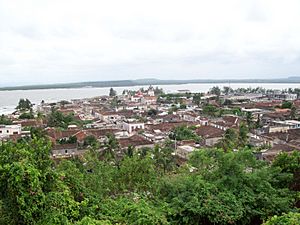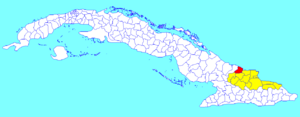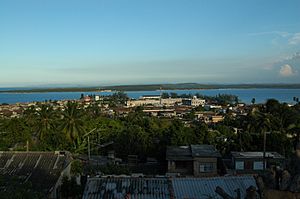Gibara facts for kids
Quick facts for kids
Gibara
|
||
|---|---|---|
 |
||
|
||
| Nickname(s):
La Villa Blanca de los Cangrejos
|
||

Gibara municipality (red) within
Holguín Province (yellow) and Cuba |
||
| Country | Cuba | |
| Province | Holguín | |
| Established | 1817 | |
| Area | ||
| • Total | 630 km2 (240 sq mi) | |
| Elevation | 45 m (148 ft) | |
| Population
(2022)
|
||
| • Total | 69,451 | |
| • Density | 110.2/km2 (285.5/sq mi) | |
| Time zone | UTC-5 (EST) | |
| Area code(s) | +53-24 | |
Gibara is a town and municipality in the Holguín Province of Cuba. It is the fourth largest town in Holguín by population. It is also the ninth largest by area.
Contents
A Look at Gibara's History
The main town of Gibara was founded on January 16, 1817. It is often called "The White Town" (La Villa Blanca in Spanish). Gibara has a beautiful and breezy landscape. It also features great architectural designs. Its streets, houses, and parks are well-planned.
Visitors often say that Gibara's best feature is its people. They are described as helpful, friendly, and proud of their village. It is said that Admiral Christopher Columbus once called Gibara's surroundings "the most beautiful land that human eyes saw."
Columbus's Arrival in Cuba
There is some debate about where Columbus's ships first landed in Cuba. Some believe it was the Bay of Gibara. Others think it was the Bay of Bariay. The island of Cuba was discovered on October 28, 1492. This happened when Columbus's three ships, La Pinta, La Niña, and La Santa María, landed. This was during his first trip to the New World.
Gibara's Special Status
Gibara was declared a National Monument in 2002. This means it is a historically important place. Since 2003, Gibara has hosted the International Festival of Cinema. Films are shown in many different categories at this event.
Gibara's Population and Area
In 2022, Gibara municipality had a population of 69,451 people. The total area of Gibara is 630 square kilometers (about 243 square miles). This means it has a population density of about 110 people per square kilometer.
Areas within Gibara
The municipality of Gibara is divided into several smaller areas. These areas are called barrios. They include Arroyo Blanco, Blanquizal, Bocas, Candelaria, Cantimplora, Cupeycillos, Palmita, and Rabón.
See also
 In Spanish: Gibara para niños
In Spanish: Gibara para niños



